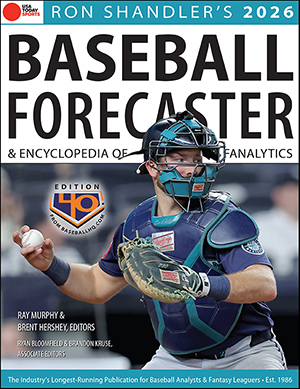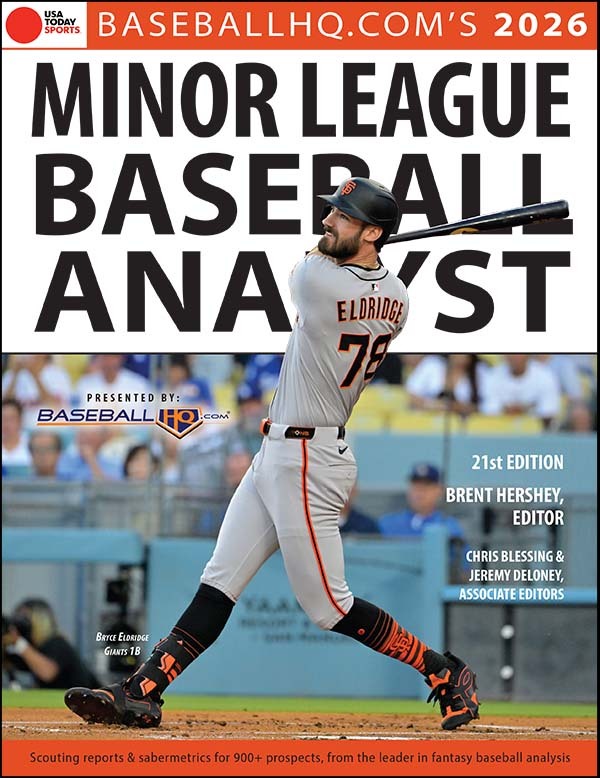
(*) MASTER NOTES: Not so different after all?
This spring, there have been a number of discussions on Baseball HQ Radio about daily fantasy games. Host Patrick Davitt has engaged his various guests in interesting explorations of various aspects of this growth area of this industry, from strategies to legalities.
From our perspective as content providers, the explosive growth of these games is simply too compelling to ignore. That's reflected in the conversations on our podcast: as recently as three years ago, it's possible that none of the guests would have had anything to say on the concept, if they had even heard of daily gaming back then. (I know I was in the dark three years ago.) Now, everyone's at least able to contribute to the discussion, whether or not they are active daily players. Daily games have quickly become an accepted part of the landscape.
Full disclosure: I've been playing them a bit. BaseballHQ.com ran some promotions with DraftStreet last year, so I played in those with our subscribers and then continued to play a bit last season. I've been playing them more regularly this year, mostly because we are exploring what sort of offerings that BaseballHQ.com should provide to daily players, and it helps to actually be a daily game player when trying to answer that question.
These daily games are frequently likened to a game of chance more than a game of skill. To some fantasy baseball traditionalists, that characterization alone is a turn-off. For me, I've been known to enjoy a game of chance from time to time, so I'm not put off by that description.
In my particular experience this past week, though, I found that these games may not be so different after all.
Some background: recently I've been evaluating the teams I drafted this season. I covered my LABR-Mixed draft here a few months ago. Even though it's been mired in the middle of the pack in the early standings, this team seems like one of my stronger ones: it's now healthy, has no major weaknesses, and has some guys who seem to be breaking out (like last-round pick Dallas Kuechel, pictured above). So, even though it entered this week sitting some 20 points out of first and in 7th or 8th place, I liked this team's chances to improve.
My daily game experience has been similar in some ways. Obviously in that format you don't have a consistent roster to manage. But I felt like I had been picking decent teams, in line with a set of principles for what sorts of players I wanted to target daily. The results haven't been that good; in fact I had lost a good chunk of the initial deposit I'd made on Opening Day. Still, one of the common themes from those prior podcast conversations had been that you need to play a lot to let the inherent variance smooth out, so that's what I have been doing, hoping the better results would eventually come.
So, in both LABR-Mixed and my daily play, I was basically waiting for an improvement in my fortunes. I was pretty convinced that my processes were sound, most days it seemed like I was one or two players away from a really big finish. And the lost money seemed like more of an issue of poor bankroll management (another theme from prior podcasts) than from drafting poor teams. Basically, I was waiting for results that would validate that evaluation.
And on Tuesday night, that validation came... in both arenas:
My LABR-Mixed team put up the following line:
16-49, 8 Runs, 11 RBI, 1 HR.
26.2 IP, 2 Wins, 1 Save, 27 K, 1.01 ERA, 0.90 WHIP
That was enough to pick up 16 standings points and jump all the way to 2nd place (and I slipped into first the next day). It's just one day, and being in first in May doesn't mean anything. But it completely validates my previous evaluation that this was a contending team trapped in a middle-of-the-pack standing.
Meanwhile, my daily game entry that night was putting on a show of it's own:
16-35, 13 RBI, 10 Runs, 2 HR
20.2 IP, 3 Wins, 0 runs allowed, 21 K
That entry was good enough to outright win a 550-person event, turning my $5 entry fee into $500. That one finish flipped my bankroll well into the black for the season. Since dollars are the standings measurement tool in the daily game space, that's the equivalent of suddenly finding yourself in contention.
My takeaway here is that these two formats may not be that different after all. There were a couple of guys who were on both roster, including the one we mentioned above: Dallas Keuchel, who threw a complete-game shutout that night.
But more than common players, there are still plenty of similarities between the formats. We're still predicting player performance, that's an obvious similarity. But even on the roster management side, there are parallel skills: you have to practice excruciating patience at times, you have to self-evaluate and identify areas for improvement at other times. In short, the units of measure may be different, but the skills required for success can translate between the games.
And of course, winning is fun in both places.





-300x200.png)



